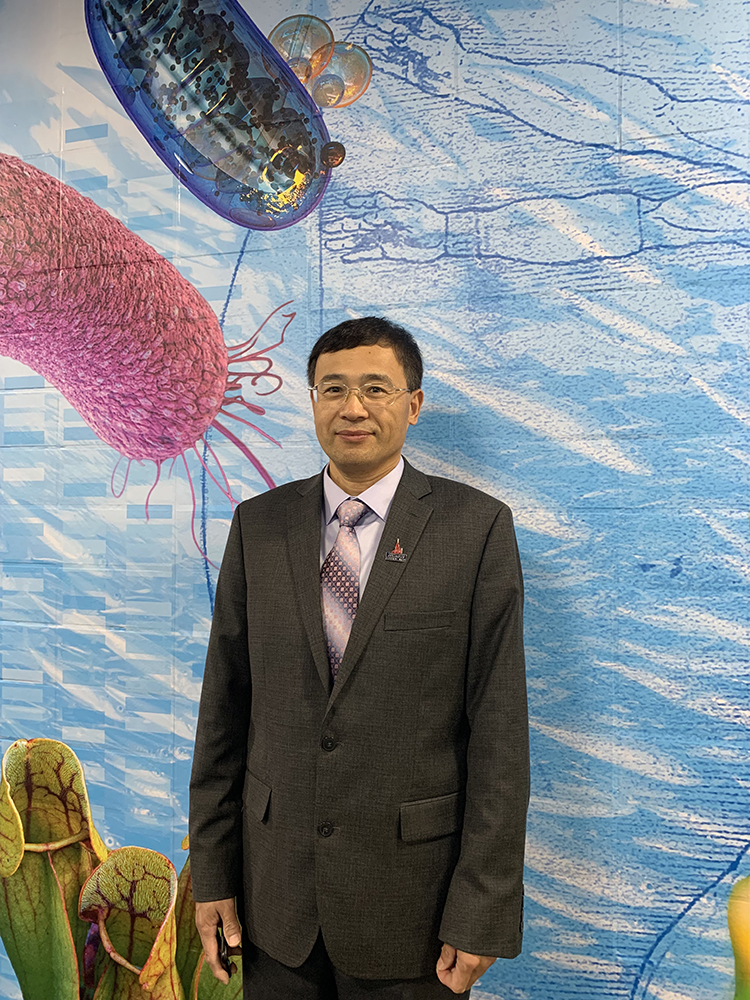
Sixue Chen, new chair of the UM Department of Biology, studies the mechanisms of more efficient plants in an effort to improve agricultural practices. Photo by Julia Dent
Sixue Chen brings focus on plant efficiency and desire to increase student opportunities
Sixue Chen, an accomplished biological researcher and new chair of the Department of Biology at the University of Mississippi, plans to use agricultural research and outreach to elevate the program nationally.
Chen, who specializes in systems biology of plant stress response, came to UM from the University of Florida, where he conducted research into understanding the mechanisms of more efficient plants in an effort to improve domestic agricultural practices.
His research is motivated by his childhood experience of growing up on a farm, but paradoxically, having little to eat. Chen believes that studying subjects such as the function of microscopic pores on plant leaf surfaces can reveal ways to improve agricultural practices and water conservation.
This approach could help to combat both world hunger and the imminent freshwater crisis as the climate becomes more arid and less conducive to current agricultural methods.
“One way to help stop food insecurity is to make plants more stress resilient,” he said. “After we domesticated the agriculture crops, farmers give these plants tons of water, which takes up 70% of our fresh water resources.
“They don’t consider making plants more drought-tolerant because they assume there will always be plenty of water, but that is not the case anymore. Around the world, countries are experiencing drought conditions, so my lab wants to make plants use water more efficiently, like cacti.”
Another concern related to modern agricultural practices is the effects of hazardous chemicals used for farming, Chen said. Some of these products increase the likelihood of cancer, as carcinogens, in humans who consume the produce or otherwise encounter the pesticides or herbicides.
This is a major concern as cancer is the nation’s No. 2 killer, behind heart disease.
Although he only recently joined the Ole Miss faculty, Chen already has a passion for helping the community and state – chiefly focusing on the future generation of scholars.
“We are a flagship university, so how do we help our citizens out of poverty?” he said. “If we encourage childhood education – make the kids excited to learn science and pursue education – I think that is one way to get out of poverty.
“I was a really poor kid growing up; at that time the only way to get out of poverty was education.”
Chen hopes to propagate a community of diverse, science-loving scholars at the university.
“Connections are important; social and academic events to bring people together provide more and more opportunities – not just for the people, but potentially for the whole world,” he said.
“The connections you make in college can become job opportunities or other collaborative opportunities to advance your career or science, as we know it, later down the line – all because a student had the chance to talk to someone with similar interests in their university.”
Chen’s work promises to improve education and research across the College of Liberal Arts and the entire university, said Donald Dyer, associate dean for faculty and academic affairs and distinguished professor of modern languages.
“His disciplinary know-how will translate into valued leadership and his experience will serve the department well in terms of mentorship and future departmental success. A successful researcher and grant recipient, he will oversee one of the larger faculties in the college and one of the largest undergraduate majors, among other things.”
By Abigail Martin




